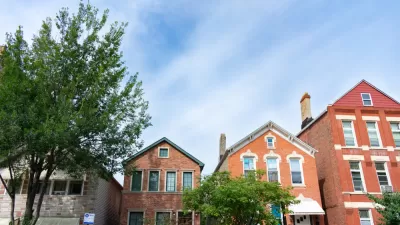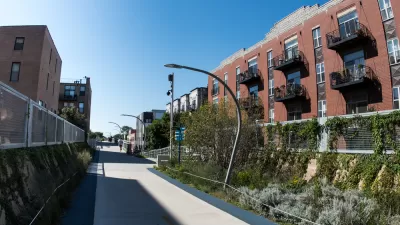Chicago's Bronzeville neighborhood has seen a dramatic rise in incomes and property values over the past decade. Emily Badger examines the historically black neighborhood's non-white gentrification, and how it's viewed differently than other areas.
On the South Side of Chicago, Bronzeville has been making great strides since its high-rise public housing projects were demolished starting in the 1990s. And although, as Badger mentions, "[c]ommunity leaders in Bronzeville want middle-class outsiders to come in, at least to consume the redeveloped neighborhood as a quasi-tourist destination on par with the city’s Chinatown or Greektown, as a mecca for black history and culture," the gentrification (if one can call it that) of the neighborhood by black residents hasn't attracted outsiders in the same way that the rise of the nearby Pilsen neighborhood has.
A recent study by Matthew Anderson and Carolina Sternberg, published in the journal Urban Affairs Review, compares the different experiences of gentrification in the two neighborhoods, and the impact on our understanding of the phenomenon. Pilsen, a destination for Mexican migrants over the past half-century, and now "a draw for residents across the city in search of Mexican food and culture...has pulled off what Bronzeville hasn’t."
"[Pilsen's Mexican] culture seems somehow more marketable," says Badger. Whereas, "[t]he city seems less willing or able to change its perception of Bronzeville."
"In Anderson’s interviews with white middle-class Chicago residents, it sounds almost as if they can’t distinguish between poor and middle-class blacks living there. It’s as if gentrification can’t happen without an influx of white residents, and so it must not be happening there. How can the neighborhood’s prospects have really changed if its demographics haven’t? Bronzeville's historic "blackness" – to borrow a term from the academics – appears to overwhelm any sense of its identity as a neighborhood on the way up."
FULL STORY: How Black Gentrifiers Have Affected the Perception of Chicago's Changing Neighborhoods

Maui's Vacation Rental Debate Turns Ugly
Verbal attacks, misinformation campaigns and fistfights plague a high-stakes debate to convert thousands of vacation rentals into long-term housing.

Planetizen Federal Action Tracker
A weekly monitor of how Trump’s orders and actions are impacting planners and planning in America.

San Francisco Suspends Traffic Calming Amidst Record Deaths
Citing “a challenging fiscal landscape,” the city will cease the program on the heels of 42 traffic deaths, including 24 pedestrians.

Defunct Pittsburgh Power Plant to Become Residential Tower
A decommissioned steam heat plant will be redeveloped into almost 100 affordable housing units.

Trump Prompts Restructuring of Transportation Research Board in “Unprecedented Overreach”
The TRB has eliminated more than half of its committees including those focused on climate, equity, and cities.

Amtrak Rolls Out New Orleans to Alabama “Mardi Gras” Train
The new service will operate morning and evening departures between Mobile and New Orleans.
Urban Design for Planners 1: Software Tools
This six-course series explores essential urban design concepts using open source software and equips planners with the tools they need to participate fully in the urban design process.
Planning for Universal Design
Learn the tools for implementing Universal Design in planning regulations.
Heyer Gruel & Associates PA
JM Goldson LLC
Custer County Colorado
City of Camden Redevelopment Agency
City of Astoria
Transportation Research & Education Center (TREC) at Portland State University
Jefferson Parish Government
Camden Redevelopment Agency
City of Claremont





























